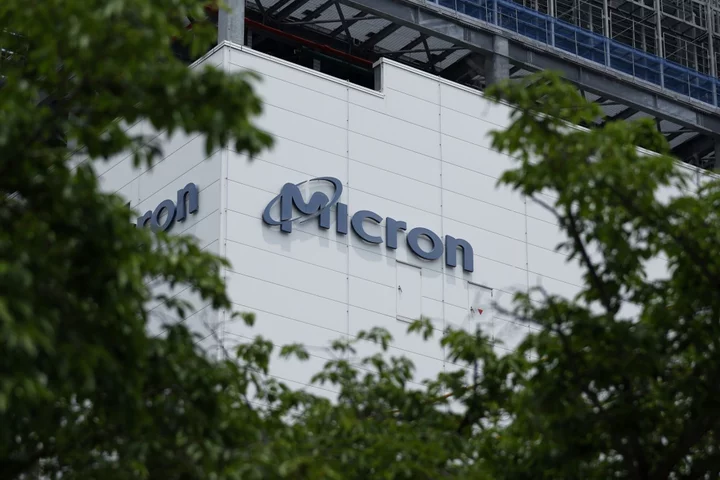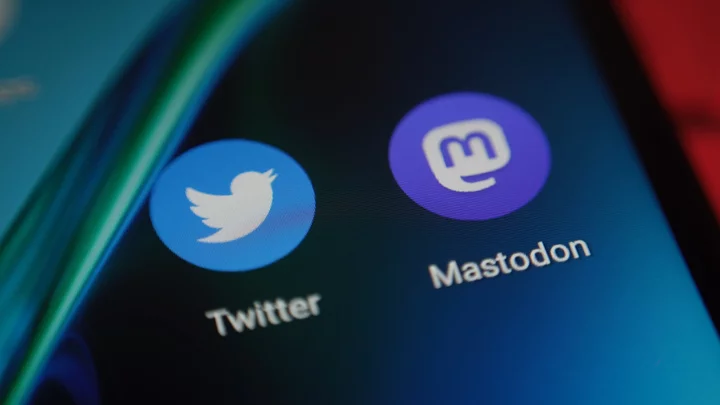China’s move to ban Micron Technology Inc.’s products marked its most meaningful retaliation yet against US export controls. Now the question is whether President Xi Jinping will go after even bigger targets, risking blowback to his own economy.
Until this week, Beijing hadn’t responded in kind to US moves to kneecap China’s access to advanced chips and other technology, which President Joe Biden has said could be used for military modernization. China has repeatedly blasted the actions as the “long-arm” of US hegemony, while taking few meaningful actions against American companies.
The Micron decision, coming shortly after Group of Seven leaders published a communique vowing to counter Beijing’s “economic coercion,” appears to mark a shift in thinking. The action may lead to material damage to a firm that gets 11% of its revenue from China, according to data compiled by Bloomberg.
However, the damage to Chinese industry is minimal as it easily replace Micron’s memory chips with similar products from local suppliers as well as South Korea’s Samsung Electronics Co. and SK Hynix Inc. The real test will be whether China makes any moves against US companies like Qualcomm Inc. and Intel Corp., which make chips used in Chinese smartphones and servers that are much harder to replace.
That’s deemed unlikely for now because of the damage it could wreak on China’s domestic supply chain, hurting the nation’s growth at a time when its economic recovery is uncertain. Foreign companies have already been spooked by a crackdown on consulting companies, as well as a range of risks stemming from increased tensions between the world’s biggest economies.
“The approach of limiting US firms like Micron intends to send a signal that Beijing is willing to bear some pain as it contests with the US,” said Ja Ian Chong, an associate professor of political science at the National University of Singapore. “But Beijing is quite careful to limit costs to itself.”
Chinese Commerce Minister Wang Wentao on Monday tried to assure foreign businesses that China would protect their interests and rights, showing some effort to limit the damage. He’s set to meet this week with both US Commerce Secretary Gina Raimondo in Washington and US Trade Representative Katherine Tai in Detroit, some of the first high-level meetings in months after relations deteriorated over the shooting down of what the US said was a Chinese spy balloon.
Xi has struggled for years to find a response to US sanctions, tariffs and export controls that makes China look tough without scaring off foreign companies. While the White House’s sweeping October curbs on advanced semiconductors were aimed at blocking Beijing from a whole industry, the Micron move merely limits the Chinese operations of a single US firm. Beijing also gave itself plenty of flexibility in how to implement the decision.
The cyberspace agency highlighted how Micron chips are risky for critical information infrastructure, such as data centers or cloud computing services. But Micron sells most of its chips for less sensitive consumer electronics, including smartphones and laptop computers. Jefferies analysts including Edison Lee highlighted this distinction in a research note, saying the Chinese decision’s impact will be “quite limited.”
“China doesn’t really pay a cost for this,” said Evan Medeiros, who worked on China at the National Security Council during the Obama administration and is now a professor of Asian Studies at Georgetown University.
“The Micron action shows the Chinese are struggling to find retaliation tools that don’t do them more harm than good,” he added. “It’s not even tit for tat.”
‘Priority of Priorities’
Still, some analysts see Micron as the first of many moves after Xi called protecting industrial security the “priority of priorities” at a high-profile meeting earlier this month. At the same time, the US and Europe are moving to “de-risk” supply chains to avoid relying on China for critical materials.
“Micron will be the first firm but there are many to come,” said Henry Gao, a professor on Chinese trade law at Singapore Management University. “You see this kind of national security justifications for various matters in China since President Xi came into office. Basically he was saying everything is national security now.”
One area where China could retaliate further is the electric vehicle sector, according to Yongwook Ryu, assistant professor specializing in international relations at the Lee Kuan Yew School of Public Policy at the National University of Singapore.
“EVs are one area where Chinese firms can replace US products quite easily and generate benefits for domestic firms such as BYD,” he added, suggesting Tesla Inc. could be a target. The US-based manufacturer has operations in China, including a gigafactory in Shanghai.
‘Unreliable Entity’ List
China has assembled a legal toolkit to retaliate against US sanctions in recent years, such as announcing an “unreliable entity” list in mid-2019. In 2020, it imposed unspecified sanctions against Boeing Co.’s defense unit, Lockheed Martin Corp. and Raytheon Technologies Corp. after the US approved $1.8 billion in arms sales to Taiwan, and followed that up with more sanctions, fines and travel bans.
Yet China couldn’t enforce those punishments as none of the sanctioned companies or individuals were in China. Beijing avoided targeting Pratt & Whitney, another Raytheon subsidiary, or Boeing itself, both of which have significant business in China.
Instead, China has tended to use tariffs to punish foreign governments for decisions that cross its so-called red lines, while avoiding curbs that jeopardized its supply chains.
After Australia called for the World Health Organization to investigate the origins of Covid-19, for example, China imposed import tariffs or bans on products such as wine and lobsters, but refrained from targeting the critical import of Australian iron ore.
Xi has also been careful not to target Taiwanese firms Taiwan Semiconductor Manufacturing Co. and Hon Hai Precision Industry Co. over territorial disputes with the self-ruled island. TSMC supplies China with critical chips the country needs, while Hon Hai hires hundreds of thousands of workers in China to assemble gadgets for Apple Inc.
The action against Micron appears “targeted and political,” said Gerard DiPippo, senior fellow at the Center for Strategic and International Studies, who worked for more than a decade in US intelligence.
“If you’re China and want to pick a notable target in a priority sector that you can scare away and replace without too much damage, Micron seems to fit the bill,” he said. “In general, the Chinese government has been pretty reluctant to retaliate against American firms, because they think the US government will punch back.”
--With assistance from Gao Yuan, Kari Lindberg, Rebecca Choong Wilkins, Peter Elstrom and Edwin Chan.









